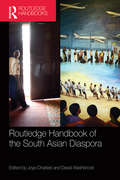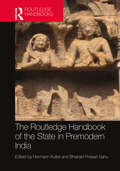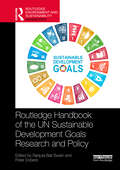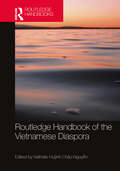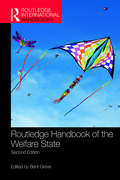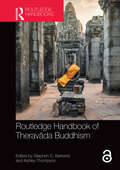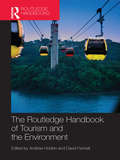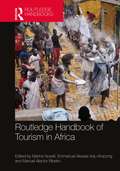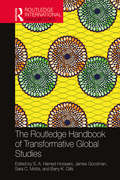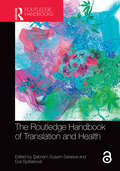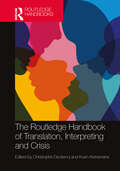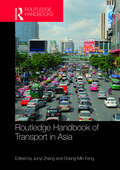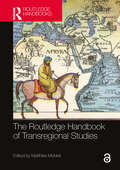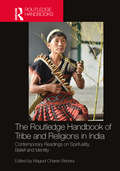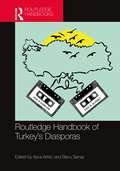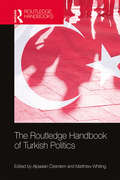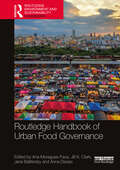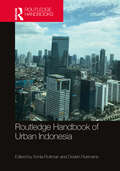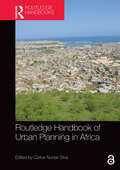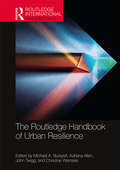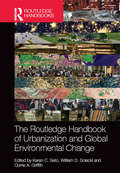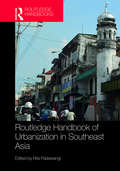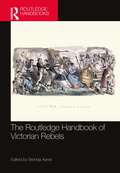- Table View
- List View
Routledge Handbook of the South Asian Diaspora
by Joya Chatterji David WashbrookSouth Asia’s diaspora is among the world’s largest and most widespread, and it is growing exponentially. It is estimated that over 25 million persons of Indian descent live abroad; and many more millions have roots in other countries of the subcontinent, in Pakistan, Bangladesh and Sri Lanka. There are 3 million South Asians in the UK and approximately the same number resides in North America. South Asians are an extremely significant presence in Southeast Asia and Africa, and increasingly visible in the Middle East. This inter-disciplinary handbook on the South Asian diaspora brings together contributions by leading scholars and rising stars on different aspects of its history, anthropology and geography, as well as its contemporary political and socio-cultural implications. The Handbook is split into five main sections, with chapters looking at mobile South Asians in the early modern world before moving on to discuss diaspora in relation to empire, nation, nation state and the neighbourhood, and globalisation and culture. Contributors highlight how South Asian diaspora has influenced politics, business, labour, marriage, family and culture. This much needed and pioneering venture provides an invaluable reference work for students, scholars and policy makers interested in South Asian Studies.
The Routledge Handbook of the State in Premodern India
by Hermann Kulke and Bhairabi Prasad SahuThis handbook presents a multilayered and multidimensional history of state formation in premodern India. It explores dense and rich local and subregional historiography from the mid-first millennium BC to the eighteenth century in South Asia. Shifting the focus away from economic and political factors, this handbook revises the conventional understanding of states and empires and locates them in their quotidian conduct and activity on socio-cultural and concomitant factors. Comprehensive in scope, this handbook addresses a range of themes connected with the idea of state formation in the subcontinent. It includes discussions and debates on ritual practices and the Brahmanical order in early India; the Delhi Sultanate and role of Sultans among the Hindu kings; the cosmopolitan ‘Islamicate’ cultural influences on Puranic Hinduism; cultural background of the Mughal state. The handbook examines new questions and ideologies of state formation, such as: · facets of violence and resistance; · the significance of the autonomous spaces and forests; · regional elites, including ‘Little kings’; tribal background of some famous cults; · trade and maritime commerce; · royal patronage, courtly manners, lineage formation; · imperial architecture, monuments, and temple, among others. Featuring case studies from different part of the India subcontinent, and with contributions by renowned historians, this authoritative handbook will be an indispensable reading for teachers, scholars, and students of early India, medieval India, premodern India, South Asian history, Asian history, historiography, economic history, historical sociology, and South Asia studies.
Routledge Handbook of the UN Sustainable Development Goals Research and Policy (Routledge Environment and Sustainability Handbooks)
by Ranjula Bali Swain Peter DobersThis handbook brings together a collection of seminal research on the Sustainable Development Goals (SDGs) and investigates the effectiveness of the 17 goals for achieving transformative change toward sustainable development. As a collection of inter- and transdisciplinary research from around the world, this volume explores the applications, implications, and best practices of the goals at thematic, regional, and national levels, providing specific examples from a diverse range of places, such as Australia, Brazil, China, DRC, India, Italy, the Sahel region of Africa, and the USA, among others. The book serves as a mid-term evaluation of the SDGs, bringing to the fore comprehensive experiences and evidence related to the SDGs, whilst highlighting the interlinkages between the different goals. The handbook is divided into two parts: Part I brings together groundbreaking research to define, identify, and present conceptual frameworks for a sustainable future, whilst Part II focuses on the policies, practices, and implementation of the SDGs. The chapters identify key aspects missing from the 2030 Agenda, such as global power imbalances, cultural diversity, Indigenous rights, and unsustainable levels of consumption; they also critically evaluate the overall delivery and effectiveness of the SDGs whilst outlining potential future directions for the post-SDG 2030 Agenda. This handbook is aimed at a diverse and global audience of academics and students of economics, business studies, political science, and development studies. It will also serve as a valuable reference for leaders in the industry, the public sector, civil society, and international policymakers keen to gain a better understanding of the SDGs.
Routledge Handbook of the Vietnamese Diaspora
by Nathalie Huỳnh Châu NguyễnThe Routledge Handbook of the Vietnamese Diaspora presents a comprehensive overview and analysis of Vietnamese migrations and diasporas, including the post-1975 diaspora, one of the most significant and highly visible diasporas of the late twentieth century.This handbook delves into the processes of Vietnamese migration and highlights the variety of Vietnamese diasporic journeys, trajectories and communities as well as the richness and depth of Vietnamese diasporic literary and cultural production. The contributions across the fields of history, anthropology, sociology, literary studies, film studies and cultural studies point to the diversity of approaches relating to scholarship on Vietnamese diasporas.The handbook is structured in five parts: Colonial legacies Refugees, histories and communities Migrant workers, international students and mobilities Literary and cultural production Diasporas and negotiations Offering multiple cutting-edge interpretations, representations and reconstructions of diaspora and the diasporic experience, this first reference work of the Vietnamese diaspora will be an invaluable tool for students and researchers in the fields of Asian Studies, Asian American Studies, Ethnic Studies, Refugee Studies, Transnational Studies and Migration and Diaspora Studies.
Routledge Handbook of the Welfare State (Routledge International Handbooks)
by Bent GreveForty-five contributions from renowned international specialists in the field provide readers with expert analysis of the core issues related to the welfare state, including regional depictions of welfare states around the globe. The second edition of the Routledge Handbook of the Welfare State combines essays on methodologies, core concepts and central policy areas to produce a comprehensive understanding of what ‘the welfare state’ means around the world. In the aftermath of the credit crunch, the Handbook addresses some of the many questions about the welfare state. This second edition has been thoroughly revised and updated to include an in-depth analysis of societal changes in recent years. New articles can be found on topics such as: the impact of ideas, well-being, migration, globalisation, India, welfare typologies, homelessness and long-term care. This volume will be an invaluable reference book for students and scholars throughout the social sciences, particularly in sociology, social policy, public policy, international relations, politics and gender studies.
Routledge Handbook of Theravāda Buddhism
by Ashley Thompson Stephen C. BerkwitzAmong one of the older sub-fields in Buddhist Studies, the study of Theravāda Buddhism is undergoing a revival by contemporary scholars who are revising long-held conventional views of the tradition while undertaking new approaches and engaging new subject matter. The term Theravāda has been refined, and research has expanded beyond the analysis of canonical texts to examine contemporary cultural forms, social movements linked with meditation practices, material culture, and vernacular language texts. The Routledge Handbook of Theravāda Buddhism illustrates the growth and new directions of scholarship in the study of Theravāda Buddhism and is structured in four parts: Ideas/Ideals Practices/Persons Texts/Teachings Images/Imaginations Owing largely to the continued vitality of Theravāda Buddhist communities in countries like Sri Lanka, Myanmar, Thailand, Cambodia, and Laos, as well as in diaspora communities across the globe, traditions associated with what is commonly (and fairly recently) called Theravāda attract considerable attention from scholars and practitioners around the world. An in-depth guide to the distinctive features of Theravāda, the Handbook will be an invaluable resource to provide structure and guidance for scholars and students of Asian Religion, Buddhism and in particular Theravāda Buddhism.
The Routledge Handbook of Tourism and the Environment
by Andrew Holden David FennellThe Routledge Handbook of Tourism and the Environment explores and critically evaluates the debates and controversies inherent to tourism’s relationship with nature, especially pertinent at a time of major re-evaluation of our relationship with the environment as a consequence of the environmental problems we now face. It brings together leading specialists from range of disciplinary backgrounds and geographical regions, to provide state-of-the-art theoretical reflection and empirical research on this complex relationship and future direction. The book is divided in to five interrelated sections. Section one evaluates the philosophical basis, rationale and complexity of what is meant by the term ‘environment’ considering the major influences in the construction of how we understand our surroundings and the types of values we place upon them. Section two evaluates the types of eco-systems that are used as natural resources for tourism and the negative and positive impacts upon them. Section three evaluates relevant environmental policy and management mechanisms for the impacts of tourism on the natural environment. Section four focuses on the changing tourism-environment relationship, and the types of tourism that have become established in the tourism industry, market and policy. Section five, analyzes contemporary and future issues of the tourism-environment relationship, based upon themes of environmental and social welfare. This timely book will provide an invaluable resource for all those with an interest in tourism’s relationship with the natural environment, encouraging dialogue across disciplinary boundaries and areas of study. The book is international in its focus, emphasizing that issues of tourism and the natural environment are not only localized but transcend national boundaries that sometimes require both international and global responses. This is essential reading for student, researchers and academics of Tourism as well as those of Geography, Environmental Studies and Development Studies.
Routledge Handbook of Tourism in Africa
by Novelli Marina Adu-Ampong Emmanuel Akwasi Ribeiro Manuel AlectorThis book provides a comprehensive and readable overview of the critical debates and controversies around tourism in Africa, and the major factors that are affecting tourism development now and in the future. Drawing upon research emerging from collaborations between a growing number of African academics and practitioners based in the continent and in the African diaspora as well as international colleagues, the Handbook offers key critical insights into the issues, challenges and trends that Africa and African tourism is facing. Part I covers continent-wide issues such as climate change, ICT, heritage and development. The remaining parts are organised along geographic lines, with each chapter covering the development of tourism, current trends and discussion of critical issues such as community participation, gender, backpacking, urban tourism, wildlife tourism and conservation. Combining an overview of key theories, concepts, contemporary issues and debates, this book will be a valuable resource for students, academics and practitioners investigating the role of tourism in Africa.
Routledge Handbook of Traditional Chinese Literature
by Victor H. Mair Zhenjun ZhangThis Handbook presents a comprehensive overview of 3,000 years of Chinese literature from its earliest beginnings to the end of the Qing (1644–1911), the last empire of China. With a focus on well-known authors and masterpieces in each important genre, this volume covers verses, prose, drama, and fiction arranged in the following thematic groupings: Pre-Qin and Han poetry, poetry of the Six Dynasties, poetry of the Tang, poetry of the Song, and lyrics of the Song Prose of historians, prose of philosophers, and literati prose Tragedy and romance in Yuan drama, southern plays of ethics, and chuanqi plays of the Ming and the Qing Classical-language tales, vernacular short stories, heroic romances, novels of spirits and devils, novels of manners and satire, and novels of social exposure and prostitution Featuring both introductions and in-depth analyses, this Handbook incorporates the most recent scholarly works for each entry and also facilitates future research by providing further readings. Authored by a stellar line-up of experts in the field of Chinese literature, this is an essential reference guide for all students and scholars in the fields of Chinese literature and culture.
The Routledge Handbook of Transformative Global Studies (Routledge International Handbooks)
by S. A. Hamed HosseiniThe Routledge Handbook of Transformative Global Studies provides diverse and cutting-edge perspectives on this fast-changing field. For 30 years the world has been caught in a long ‘global interregnum,’ plunging from one crisis to the next and witnessing the emergence of new, vibrant, multiple, and sometimes contradictory forms of popular resistance and politics. This global ‘interregnum’ – or a period of uncertainty where the old hegemony is fading and the new ones have not yet been fully realized – necessitates critical self-reflection, brave intellectual speculation and (un)learning of perceived wisdoms, and greater transdisciplinary collaboration across theories, localities, and subjects. This Handbook takes up this challenge by developing fresh perspectives on globalization, development, neoliberalism, capitalism, and their progressive alternatives, addressing issues of democracy, power, inequality, insecurity, precarity, wellbeing, education, displacement, social movements, violence and war, and climate change. Throughout, it emphasizes the dynamics for system change, including bringing post-capitalist, feminist, (de)colonial, and other critical perspectives to support transformative global praxis. This volume brings together a mixture of fresh and established scholars from across disciplines and from a range of both Northern and Southern contexts. Researchers and students from around the world and across the fields of politics, sociology, international development, international relations, geography, economics, area studies, and philosophy will find this an invaluable and fresh guide to global studies in the 21st century.
The Routledge Handbook of Translation and Health (Routledge Handbooks in Translation and Interpreting Studies)
by Şebnem Susam-SaraevaThe Routledge Handbook of Translation and Health provides a bridge between translation studies and the burgeoning field of health humanities, which seeks novel ways of understanding health and illness. As discourses around health and illness are dependent on languages for their transmission, impact, spread, acceptance and rejection in local settings, translation studies offers a wealth of data, theoretical approaches and methods for studying health and illness globally. Translation and health intersect in a multitude of settings, historical moments, genres, media and users. This volume brings together topics ranging from interpreting in healthcare settings to translation within medical sciences, from historical and contemporary travels of medicine through translation to areas such as global epidemics, disaster situations, interpreting for children, mental health, women’s health, disability, maternal health, queer feminisms and sexual health, and nutrition. Contributors come from a wide range of disciplines, not only from various branches of translation and interpreting studies, but also from disciplines such as psychotherapy, informatics, health communication, interdisciplinary health science and classical Islamic studies. Divided into four sections and each contribution written by leading international authorities, this timely Handbook is an indispensable resource for all students and researchers of translation and health within translation and interpreting studies, as well as medical and health humanities. Intorduction and Chapter 18 of this book are freely available as a downloadable Open Access PDF at http://www.taylorfrancis.com under a Creative Commons [Attribution-Non Commercial-No Derivatives (CC-BY-NC-ND)] 4.0 license.
The Routledge Handbook of Translation, Interpreting and Crisis (Routledge Handbooks in Translation and Interpreting Studies)
by Christophe Declercq Koen KerremansThis handbook offers a broad-ranging overview of the study of translating and interpreting in conflict and crisis settings and takes the field in new directions. Covering a wide selection of multimodal contexts that build on the fundamentals of translation, interpreting, and their in-between hybrid forms of mediation, the handbook is divided into four parts. The opening part covers perspectives on policy and practices, whether contemporary or historical, and cases truly span the globe, from Peru and Brazil, over Belgium and Sierra Leone, to Australia, Japan, and Hong Kong. International developments require profound considerations about the professionalisation of access to language in times of crises, not least in contexts of humanitarian negotiation or conflict zone interpreting–these form the second part. The subsequent part deals with spheres of community in which language needs are positioned within frames of agency, positionality, and trust, and the challenges that these face. The contributions build on cases where interpreters act as catalysts for translation needs in settings of humanitarian aid and beyond. The final part considers language strategies and solutions in crises. This handbook is the essential guide to translation and interpreting in conflict and crisis settings for advanced students and researchers of translation and interpreting studies and will be of wide interest in peace studies, political science, and beyond.
Routledge Handbook of Transport in Asia
by Junyi Zhang Cheng-Min FengAsian transportation systems and services, as well as their usage, are fraught with challenges. This handbook therefore seeks to examine the possible solutions to the problems faced by the region. It illustrates the history of transportation development in Asia and provides a comprehensive overview of research on urban and intercity transport. Presenting an extensive literature review and detailed summaries of the major findings and methodologies, this book also offers suggestions for future research activities from top-level international researchers. Written from an interdisciplinary perspective, the topics covered include: Transportation systems across Asia; Traffic accidents; Air pollution; Land use and logistics; Transport governance. Considering the population and economic development scale, as well as the diverse cultures of Asia, the Routledge Handbook of Transport in Asia will be a valuable resource for students and scholars of transportation, Asian development and Asian Studies in general.
The Routledge Handbook of Transregional Studies (Routledge History Handbooks)
by Matthias MiddellThe Routledge Handbook of Transregional Studies brings together the various fields within which transregional phenomena are scientifically observed and analysed. This handbook presents the theoretical and methodological potential of such studies for the advancement of the conceptualization of global and area-bound developments.Following three decades of intense debate about globalization and transnationalism, it has become clear that border-crossing connections and interactions between societies are highly important, yet not all extend beyond the borders of nation-states or are of truly world-wide reach. The product of extensive international and interdisciplinary cooperation, this handbook is divided into ten sections that introduce the wide variety of topics within transregional studies, including Colonialism and Post-Colonial Studies, Spatial Formats, International Organizations, Religions and Religious Movements, and Transregional Studies and Narratives of Globalization. Recognizing that transregional studies asks about the space-making and space-formatting character of connections as well as the empirical status of such connections under the global condition, the volume reaches beyond the typical confines of area and regional studies to consider how areas are transcended and transformed more widely.Combining case studies with both theoretical and methodological considerations, The Routledge Handbook of Transregional Studies provides the first overview of the currently flourishing field of transregional studies and is the ideal volume for students and scholars of this diverse subject and its related fields.
The Routledge Handbook of Tribe and Religions in India: Contemporary Readings on Spirituality, Belief and Identity
by Maguni Charan BeheraThis handbook explores the diversity of religious practice in tribal cultures in India. It looks at the interactive spaces where the religious practices of tribes and other communities have changed and adapted through the years in contemporary India.Tribe as a social category emerged in India during the colonial period; this handbook departs from the conventional approaches to studying ‘tribal religion’ and analyses the intersections of spirituality, rituals, gender and identities within tribal religion through a crosscultural and pan-Indian perspective. Tribes in India follow various religious denominations including Buddhism, Hinduism, Islam, Christianity, and traditional indigenous faiths. The chapters in this volume provide insights into the cross-cultural religiosity of tribes via ethnographic accounts and the study of animism, life cycle rituals, ancestor worship, shrines and religious institutions, revivalism, religious identities, religious conversion, transcendental religious spaces and the space for gender, identity and politics within religious traditions. It also discusses conflicts, contestations, anxieties within and the politics of religious traditions and identities in India and how tribal communities and the state negotiate with these issues.This and its companion handbook, The Routledge Handbook of Contemporary Readings on Tribe and Religions in India: Emerging Negotiations, provide a comprehensive look into the religious life and practices of a very diverse group of tribes in India. This book will be of interest to academics and researchers working in the fields of religion, anthropology, indigenous and tribal studies, social and cultural anthropology, sociology of culture, sociology of religion, development studies, history, political science, folkloristic, and colonialism.
Routledge Handbook of Turkey's Diasporas
by Banu Senay Ayca ArkilicThis handbook, the first of its kind, provides a rich overview of the socio-political issues and dynamics impacting Turkey’s diasporic groups and diaspora policymaking.Turkey constitutes an important case study in the field of diaspora studies with a diaspora population of around 6.5 million. This handbook therefore brings together emerging and established scholars to explore the central issues, actors, and processes relating to Turkey’s diasporic groups and diaspora outreach. Taken together, the historical and contemporary analyses presented in this volume provide readers a multi-lens perspective on the trajectories of Turkey’s diasporic communities and diaspora policymaking in a wide range of regional contexts, including Europe, North America, and Oceania. The handbook comprises six analytical parts: Contextualising Turkey’s diasporas: past and present Localisation, transnational belongings, and identity Governing diasporas Micro-spaces and everyday practices Cultural production, aesthetics, and creativity Country-specific perspectives The volume offers insights into the debates and processes that structure each of these thematic clusters, but also provides a comprehensive overview of the dynamics shaping Turkey’s diverse diaspora populations today.The contributions encompass a range of disciplines, including anthropology, history, human geography, political science, international relations, and sociology, and the volume will be vital reading for anyone interested in Turkey, the Middle East, and diasporas.
The Routledge Handbook of Turkish Politics
by Alpaslan Özerdem Matthew WhitingThe Routledge Handbook of Turkish Politics pulls together contributions from many of the world’s leading scholars on different aspects of Turkey. Turkey today is going through possibly the most turbulent period in its history, with major consequences both nationally and internationally. The country looks dramatically different from the Republic founded by Atatürk in 1923. The pace of change has been rapid and fundamental, with core interlinked changes in ruling institutions, political culture, political economy, and society. Divided into six main parts, this Handbook provides a single-source overview of Turkish politics: Part I: History and the making of Contemporary Turkey Part II: Politics and Institutions Part III: The Economy, Environment and Development Part IV: The Kurdish Insurgency and Security Part V: State, Society and Rights Part VI: External Relations This comprehensive Handbook is an essential resource for students of Politics, International Relations, International/Security Studies with an interest on contemporary Turkey.
Routledge Handbook of Urban Food Governance (Routledge Environment and Sustainability Handbooks)
by Ana Moragues-Faus Jill K. Clark Jane Battersby Anna DaviesThe Routledge Handbook of Urban Food Governance is the first collection to reflect on and compile the currently dispersed histories, concepts and practices involved in the increasingly popular field of urban food governance. Unpacking the power of urban food governance and its capacity to affect lives through the transformation of cities and the global food system, the Handbook is structured into five parts. The first part focuses on histories of urban food governance to trace the historical roots of current dynamics and provide an impetus for the critical lens on urban food governance threaded through the Handbook. The second part presents a broad overview of the different frames, theories and concepts that have informed urban food governance scholarship. Drawing on the previous parts, part three engages with the practice of urban food governance by analysing plans, policies and programmes implemented in different contexts. Part four presents current knowledge on how urban food governance involves different agencies that operate across scales and sectors. The final part asks key figures in this field what the future holds for urban food governance in the midst of pressing societal and environmental challenges. Containing chapters written by emerging and established scholars, as well as practitioners, the Handbook provides a state of the art, global and diverse examination of the role of cities in delivering sustainable and secure food outcomes, as well as providing refreshed theoretical and practical tools to understand and transform urban food governance to enact more sustainable and just futures. The Routledge Handbook of Urban Food Governance will be essential reading for students, scholars, practitioners and policymakers interested in food governance, urban studies, sustainable food and agriculture, and sustainable living more broadly.
Routledge Handbook of Urban Indonesia
by Deden Rukmana Sonia RoitmanThis handbook focuses on the practices, initiatives, and innovations of urban planning in response to the rapid urbanisation in Indonesian cities. The book provides rigorous evidence of planning Indonesian cities of different sizes. Indonesia, the world’s fourth most populous country, is increasingly urbanising. Through the lens of the Sustainable Development Goals, chapters examine specific policies and projects and analyse 19 cities, ranging from a megacity of over ten million residents to metropolitan cities, large cities, medium cities, and small cities in Indonesia. The handbook provides a diverse view of urban conditions in the country. Discussing current trends and challenges in urban planning and development in Indonesia, it covers a wide range of topics organised into five main themes: Indonesian planning context; informality, insurgency, and social inclusion; design, spatial, and economic practices; creative and innovative practices; and urban sustainability and resilience. Written by 64 established and emerging scholars from Indonesia and overseas, this handbook is an invaluable resource to academics working on Urban Studies, Development Studies, Asian and Southeast Studies as well as to policy-makers in Indonesia and in other cities of the Global South.
Routledge Handbook of Urban Planning in Africa
by Carlos Nunes SilvaThis handbook contributes with new evidence and new insights to the on-going debate on the de-colonization of knowledge on urban planning in Africa. African cities grew rapidly since the mid-20th century, in part due to rising rural migration and rapid internal demographic growth that followed the independence in most African countries. This rapid urbanization is commonly seen as a primary cause of the current urban management challenges with which African cities are confronted. This importance given to rapid urbanization prevented the due consideration of other dimensions of the current urban problems, challenges and changes in African cities. The contributions to this handbook explore these other dimensions, looking in particular to the nature and capacity of local self-government and to the role of urban governance and urban planning in the poor urban conditions found in most African cities. It deals with current and contemporary urban challenges and urban policy responses, but also offers an historical overview of local governance and urban policies during the colonial period in the late 19th and 20th centuries, offering ample evidence of common features, and divergent features as well, on a number of facets, from intra-urban racial segregation solutions to the relationships between the colonial power and the natives, to the assimilation policy, as practiced by the French and Portuguese and the Indirect Rule put in place by Britain in some or in part of its colonies. Using innovative approaches to the challenges confronting the governance of African cities, this handbook is an essential read for students and scholars of Urban Africa, urban planning in Africa and African Development.
Routledge Handbook of Urban Planning in Africa
by Carlos Nunes SilvaThis handbook contributes with new evidence and new insights to the on-going debate on the de-colonization of knowledge on urban planning in Africa.African cities grew rapidly since the mid-20th century, in part due to rising rural migration and rapid internal demographic growth that followed the independence in most African countries. This rapid urbanization is commonly seen as a primary cause of the current urban management challenges with which African cities are confronted. This importance given to rapid urbanization prevented the due consideration of other dimensions of the current urban problems, challenges and changes in African cities. The contributions to this handbook explore these other dimensions, looking in particular to the nature and capacity of local self-government and to the role of urban governance and urban planning in the poor urban conditions found in most African cities. It deals with current and contemporary urban challenges and urban policy responses, but also offers an historical overview of local governance and urban policies during the colonial period in the late 19th and 20th centuries, offering ample evidence of common features, and divergent features as well, on a number of facets, from intra-urban racial segregation solutions to the relationships between the colonial power and the natives, to the assimilation policy, as practiced by the French and Portuguese and the Indirect Rule put in place by Britain in some or in part of its colonies.Using innovative approaches to the challenges confronting the governance of African cities, this handbook is an essential read for students and scholars of Urban Africa, urban planning in Africa and African Development.
The Routledge Handbook of Urban Resilience (Routledge International Handbooks)
by Michael A. Burayidi Adriana Allen John Twigg Christine WamslerThis volume provides a comprehensive discussion and overview of urban resilience, including socio-ecological and economic hazard and disaster resilience. It provides a summary of state of the art thinking on resilience, the different approaches, tools and methodologies for understanding the subject in urban contexts, and brings together related reflections and initiatives. Throughout the different chapters, the handbook critically examines and reviews the resilience concept from various disciplinary and professional perspectives. It also discusses major urban crises, past and recent, and the generic lessons they provide for resilience. In this context, the authors provide case studies from different places and times, including historical material and contemporary examples, and studies that offer concrete guidance on how to approach urban resilience. Other chapters focus on how current understanding of urban systems – such as shrinking cities, green infrastructure, disaster volunteerism, and urban energy systems – are affecting the capacity of urban citizens, settlements and nation-states to respond to different forms and levels of stressors and shocks. The handbook concludes with a synthesis of the state of the art knowledge on resilience and points the way forward in refining the conceptualization and application of urban resilience. The book is intended for scholars and graduate students in urban studies, environmental and sustainability studies, geography, planning, architecture, urban design, political science and sociology, for whom it will provide an invaluable and up-to-date guide to current approaches across these disciplines that converge in the study of urban resilience. The book also provides important direction to practitioners and civic leaders who are engaged in supporting cities and regions to position themselves for resilience in the face of climate change, unpredictable socioenvironmental shocks and incremental risk accumulation.
The Routledge Handbook of Urbanization and Global Environmental Change (Routledge International Handbooks)
by Karen C. Seto William D. Solecki Corrie A. GriffithThis volume provides a comprehensive overview of the interactions and feedbacks between urbanization and global environmental change. A key focus is the examination of how urbanization influences global environmental change, and how global environmental change in turn influences urbanization processes. It has four thematic foci: Theme 1 addresses the pathways through which urbanization drives global environmental change. Theme 2 addresses the pathways through which global environmental change affects the urban system. Theme 3 addresses the interactions and responses within the urban system in response to global environmental change. Theme 4 centers on critical emerging research.
Routledge Handbook of Urbanization in Southeast Asia
by Rita PadawangiThe study of urbanization in Southeast Asia has been a growing field of research over the past decades. The Routledge Handbook of Urbanization in Southeast Asia offers a collection of the major streams and themes in the studies of the cities in the region. A focus on the urbanization process rather than the city as an object opens the topic more broadly to bring together different perspectives. This timely handbook presents these diverse views to build a clearer understanding of theoretical contributions of urban studies in Southeast Asia and to provide a complete collection of scholarly works that are thematically structured and a useful tool for teaching urbanization in Southeast Asia. Following the introduction by the editor, the handbook is structured along central, emerging themes. It contains six parts, which are each introduced by the editor: Theorizing Urbanization in Southeast Asia Migration, Networks and Identities Development and Discontents Environmental Governance The Social Production of the Urban Fabric Social Change and Alternative Development This handbook will be an essential reference work for scholars interested in Urban Studies, cities and urbanization in Asia, and Southeast Asian Studies.
The Routledge Handbook of Victorian Rebels (Routledge Literature Handbooks)
by Brenda Ayres Anne Anderson Marshall Needleman Armintor’s Purna Banerjee Preeshita Biswas S. Brooke Cameron Lauren Nicole Cameron Sujata Chattopadhyay Clay Cogswell Julia Courtney Julie Donovan Emily Dotson Aaron Eames Nick Freeman Rachel M. Friars Ginger Frost Catherine J. Golden Scott Hayes Lindsay Katzir Catherine Layton Gail Savage Daniel StuartAlthough history records that the British nineteenth century was obsessed with order,conventionality, and conformity, there were many Victorians from all walks of life, across lines of class, race, and gender, who resisted social mores and sometimes the laws themselves, in a variety of ways and to varying degrees. Some expressed dissension through music, art, literature, and social protest. Others were more subtle like manipulative wives who gained what they wanted while seemingly remaining docile and submissive. Some rebellion fermented into social and political movements. The revolt of still others was extremely executed by serial killers, criminals, and suicides. Contemporary readers can learn from these rebels and discern what values and ways that were uniquely Victorian should be retained and those that should be rejected after having observed their outcomes. To that end, this collection of essays offers a study for both novice and expert on Victorian rebels.
